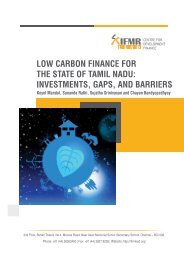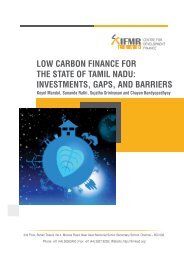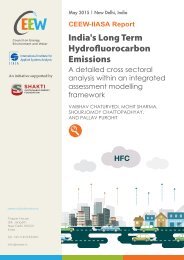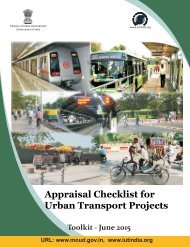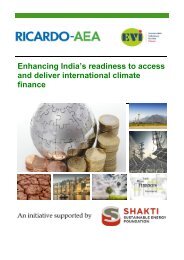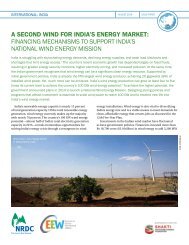Harnessing Solar energy, Options for India
A study on harnessing solar energy options for India was conducted recently by Shakti Sustainable Energy Foundation, Climate works Foundation and SSN foundation. Supporting this study it has been concluded that solar energy can play a big role in providing electricity to rural areas and thus has been included in India’s rural electrification policy. See more at: http://shaktifoundation.in/report/harnessing-solar-energy-options-for-india/
A study on harnessing solar energy options for India was conducted recently by Shakti Sustainable Energy Foundation, Climate works Foundation and SSN foundation. Supporting this study it has been concluded that solar energy can play a big role in providing electricity to rural areas and thus has been included in India’s rural electrification policy. See more at: http://shaktifoundation.in/report/harnessing-solar-energy-options-for-india/
You also want an ePaper? Increase the reach of your titles
YUMPU automatically turns print PDFs into web optimized ePapers that Google loves.
Foreword<br />
Worship the sun god, the Lord of the Universe,<br />
a rising light with effulgent rays, revered by one and all.<br />
(From the Sanskrit hymn, Aditya Hridayam, Ramayana)<br />
This century’s global challenge is <strong>energy</strong>: how to increase the generation, how to make it equitable<br />
and af<strong>for</strong>dable, and also how to keep the environment pristine without warming the planet or<br />
polluting the atmosphere. Among the renewable, sustainable and carbon-free <strong>energy</strong> generation<br />
options, solar stands out. One hour of sunshine on our planet, if stored adequately, can meet the<br />
global needs <strong>for</strong> an entire year. Regrettably, however, it remains largely unviable because of low<br />
collection efficiency and the large area required to receive sunshine. An installed capacity of 50 MW<br />
requires almost 100 hectares of land. Compare this with a natural gas generating station, where even<br />
1 or 2 hectares would suffice.<br />
An attractive option would then be to change the present pattern of <strong>energy</strong> generation. Instead of<br />
building large generation farms, is it possible to consider building small <strong>energy</strong> centres, perhaps<br />
even at homes and small stores that needs only a few watts to kilowatts of <strong>energy</strong>? These may not be<br />
grid connected, but would be as reliable and efficient as electricity from conventional sources. The<br />
challenge will then become one of making these resources efficient and economical. New innovations<br />
tend to be costly and error-prone, but with experience costs come down and efficiency and<br />
reliability increase. The scale of dissemination, and not necessarily size, will also reduce costs. At the<br />
initial stages, the support of government becomes crucial. Subsidies, tax rebates and easy-to-payback<br />
loans are all necessary to make this transition to solar, technologically and economically<br />
attractive.<br />
This report on harnessing solar <strong>energy</strong> options <strong>for</strong> <strong>India</strong>, supported by the Shakti Sustainable Energy<br />
Foundation, Climateworks Foundation and SSN Foundation, discusses the routes that are viable <strong>for</strong><br />
rural households in <strong>India</strong>. Perhaps in the coming decades harnessing solar <strong>energy</strong> on a large scale<br />
may become more efficient and af<strong>for</strong>dable. Until then, distributed <strong>energy</strong> systems are a compelling<br />
option. This is largely the message of this report.<br />
CSTEP is continuing its pursuit of studying various options <strong>for</strong> not only generating <strong>energy</strong> efficiently,<br />
but also <strong>for</strong> storing it. A few of these studies are turning out to be promising and we hope to share<br />
our results in the coming months.<br />
Dr. V. S. Arunachalam<br />
Chairman, CSTEP




